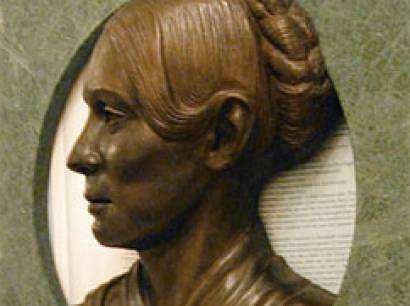This Week's Story
Dorothea Dix wanted nothing written about herself. Instead she quietly changed history.

This Week’s Story relives American history and the Bible through brief inspiring stories presented on mp3 audio recordings and text for reading.
A Cuckoo's Nest, part two
Dorothea Dix wanted nothing written about herself. Instead she quietly changed history in the United States. State legislatures throughout the country passed laws and approved funding for the mentally ill because of her on-the-ground investigations, reports, and lobbying. She was The Outstanding Reformer of Mental Health Care in the 19th century.
From 1841 to 1861 she personally saw poor mentally ill people in Europe and throughout the United States being abused. Often, they were considered savage criminals, though they had committed no crime. People hid, punished, and denied them basic food, shelter, and clothing. The public claimed, “They are demon-possessed.” Little was known about effective treatment; and treatment for those who were poor was nonexistent. Dorothea stirred state legislatures to fund the building of hospitals and treatment.
Her first statewide survey began soon after her first visit to a jail with female prisoners. She was 39 years old, financially secure, and had recovered from severe tuberculosis. On her visit, she saw a group of cells where the mentally ill prisoners were treated worse than other prisoners. Their conditions of filth and agony over-whelmed her with injustice.
She asked her minister, “What can I do to improve the lives of poor and mentally sick people?”
He gave her the names of the three leading reformers in Massachusetts and advised her, “Dorothea, arouse the public to what is happening. Ask these men for advice. They have much influence, experience, and concern for our people’s needs.”
When Dorothea spoke with Dr. Samuel Howe, Horace Mann, and Dr. Sumner, all agreed to help her. Dorothea asked, “Why is there no hospital in Boston for poor people who are mentally ill?”
“The state legislature will not vote money for one or even for a survey.”
Dorothea suggested, “What if a private person would make the survey and pay for the expense?”
“Miss Dix, do you understand how much work and time it would take to visit every jail, workhouse, and poorhouse in the state? What man would be willing to make such a survey?”
Dorothea replied, “A woman might.” A few days later she started making the survey. She found poor mentally sick people in public institutions, barns, stalls, sheds, attics, and cellars. She went to almost 500 towns in Massachusetts and recorded the conditions of 1,000 mentally ill people.
She travelled many ways; slept in rooming houses, taverns, and homes; and filled notebooks with statistics and descriptions. She observed, “People become used to seeing suffering and pay no attention to it.”
One man in a cage was fed like an animal with his food thrown on the floor. Dorothea asked his jailer, “Why do you not give the man a plate?”
“It’s all the same to him how he eats.”
Dorothea wrote in a report to the Massachusetts State Legislature, “I tell what I have seen, painful and shocking as the details often are, that from them you may feel more deeply the imperative obligation which lies upon you to prevent the possibility of a repetition or continuance of such outrages upon humanity.”
The legislature voted two hundred thousand dollars to build an addition for the mentally ill at the state hospital in Worcester.
This is Barbara Steiner. Soon let us look at Dorothea’s childhood.
Enjoy: www.thisweeksstory.com.
<< previous story] [next story >>
We invite your comments! [click here to comment]
This Week's Story is a non-profit supported by listeners. [click here to make a donation]
 click here to play audio
click here to play audio